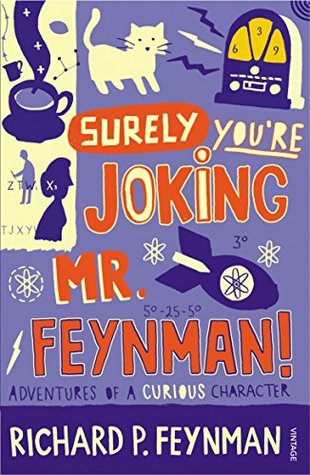More on this book
Community
Kindle Notes & Highlights
Started reading
June 21, 2022
I finally fixed it because I had, and still have, persistence. Once I get on a puzzle, I can’t get off. If my mother’s friend had said, ‘Never mind, it’s too much work,’ I’d have blown my top, because I want to beat this damn thing, as long as I’ve gone this far. I can’t just leave it after I’ve found out so much about it. I have to keep going to find out ultimately what is the matter with it in the end. That’s a puzzle drive. It’s what accounts for my wanting to decipher Mayan hieroglyphics, for trying to open safes.
But the whole problem of discovering what was the matter, and figuring out what you have to do to fix it—that was interesting to me, like a puzzle.
I learned there that innovation is a very difficult thing in the real world.
I don’t know what’s the matter with people: they don’t learn by understanding; they learn by some other way—by rote, or something. Their knowledge is so fragile!
A few years later I was in Los Alamos, where there was a man named Frederic de Hoffman, who was a sort of scientist; but more, he was also very good at administrating. Not highly trained, he liked mathematics, and worked very hard; he compensated for his lack of training by hard work.
WHEN I was an undergraduate at MIT I loved it. I thought it was a great place, and I wanted to go to graduate school there too, of course. But when I went to Professor Slater and told him of my intentions, he said, ‘We won’t let you in here.’ I said, ‘What?’ Slater asked, ‘Why do you think you should go to graduate school at MIT?’ ‘Because MIT is the best school for science in the country.’ ‘You think that?’ ‘Yeah.’ ‘That’s why you should go to some other school. You should find out how the rest of the world is.’ So I decided to go to Princeton.
Slater was right to warn me to go to another school for my graduate work. And I often advise my students the same way. Learn what the rest of the world is like. The variety is worthwhile.
They had wasted all their time memorizing stuff like that, when it could be looked up in fifteen minutes.
There was one useful lab technique I learned in that course which I still use today. They taught us how to hold a test tube and take its cap off with one hand (you use your middle and index fingers), while leaving the other hand free to do something else (like hold a pipette that you’re sucking cyanide up into). Now, I can hold my toothbrush in one hand, and with the other hand, hold the tube of toothpaste, twist the cap off, and put it back on.
What bothered me was, I thought he must have done the calculation. I only realized later that a man like Wheeler could immediately see all that stuff when you gave him the problem. I had to calculate, but he could see.
the moment I start to think about the physics, and have to concentrate on what I’m explaining, nothing else occupies my mind—I’m completely immune to being nervous. So after I started to go, I just didn’t know who was in the room. I was only explaining this idea, that’s all.
I’ve very often made mistakes in my physics by thinking the theory isn’t as good as it really is, thinking that there are lots of complications that are going to spoil it—an attitude that anything can happen, in spite of what you’re pretty sure should happen.


